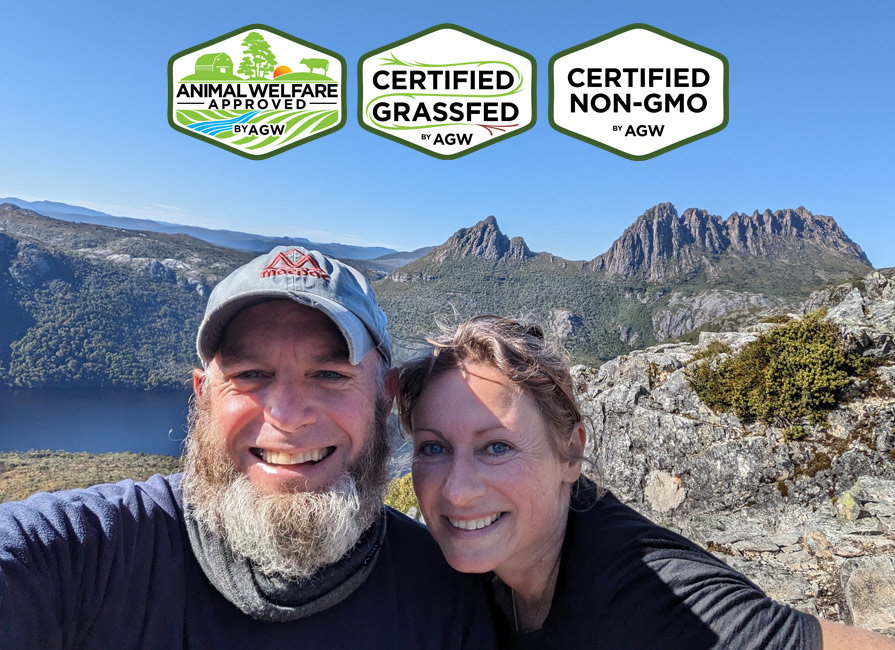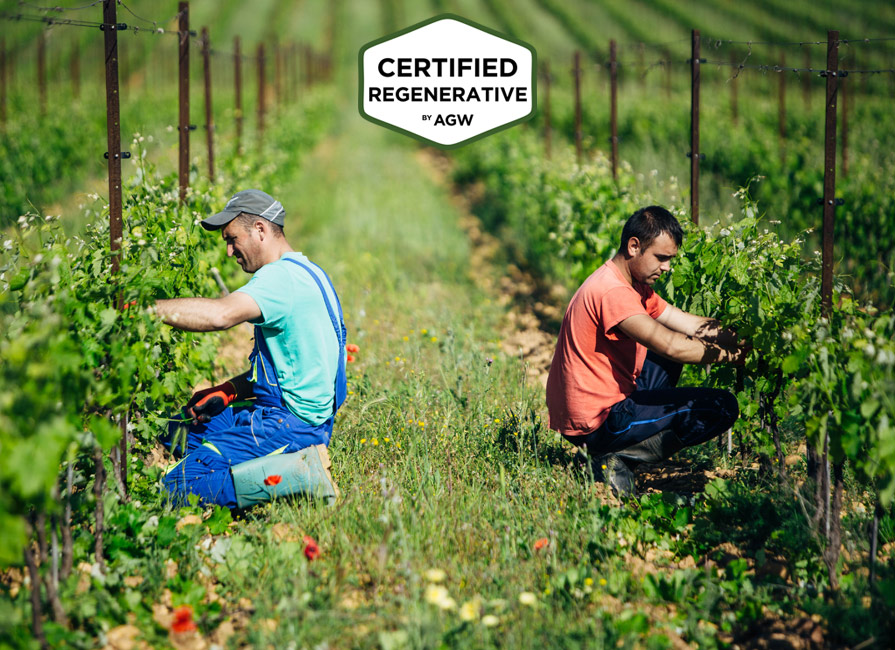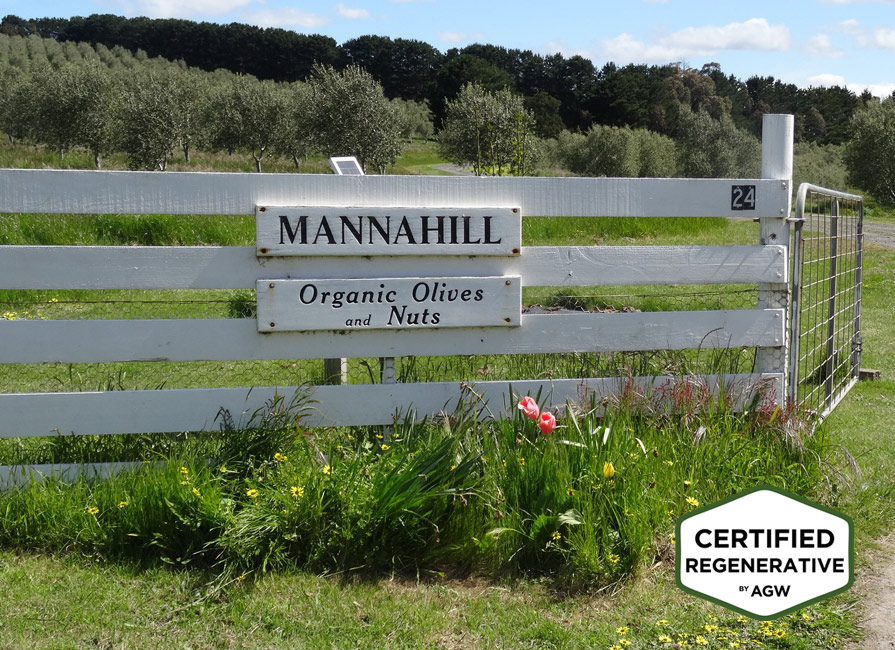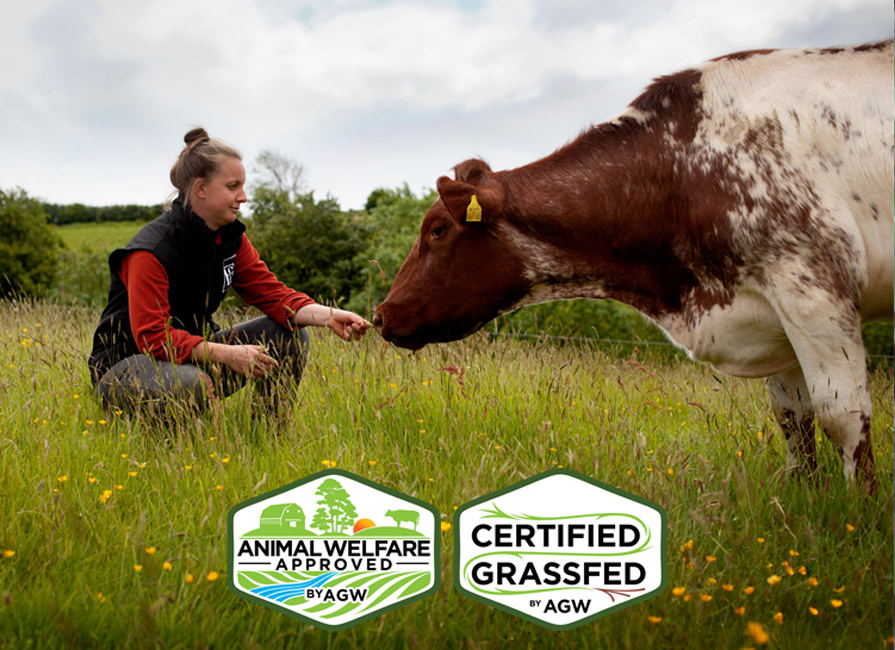Famille Gassier is one of the premier vineyards the southern Rhône Valley in the south…

Gunningham Family Farms, Mawbanna, Tasmania [AUSTRALIA]
Matthew and Pippa Gunningham established Gunningham Family Farms in 2001, shortly after migrating from the UK to Tasmania. The farming family business is located in north-west Tasmania, Australia, on a magnificent swathe of beautiful, rich farmland along the edge of the Tarkine, an extraordinary and relatively untouched protected region of Tasmania. As well as growing the business, Matthew and Pippa also had a family, with children Henry, Amelia, Olivia, Elsa and William helping out with farm chores.
The Gunningham Family Farms business comprises two certified organic dairy herds – Mawbanna Dairy near Mawbanna and Seamont Dairy near Montumana, each milking around 700 New Zealand Jersey-Friesian cross cows – as well as a 400 Angus beef suckler herd, and a small flock of sheep, and a small number of goats and pigs – all raised outdoors on pasture. They sell a significant number of beef cross calves from the dairy herd to other farmers locally, who rear them on their farms. The Gunninghams also run a 3,000-bird flock of pasture-raised laying hens in mobile coops, selling the eggs locally under the popular Shakespeare Hills Eggs brand, named after the Shakespeare Hills that surround and divide the two farms.
The Certified Animal Welfare Approved by AGW dairy and beef cows, sheep, and goats at Gunningham Family Farms are raised outdoor on pasture on species-rich pasture using rotational management, grazing one area of pasture before being moved to fresh fields. This type of management allows grass to recover before cattle and sheep return to graze again, ensuring the most nutritious grass is available. It also helps to keep the soil naturally fertilised and minimises the build-up of internal parasites, thereby avoiding reliance on chemical treatments.
In addition to being Certified Animal Welfare Approved by AGW, the dairy and beef cows, sheep and goats at Gunningham Family Farms are also Certified Grassfed by AGW. This grassfed label guarantees a 100 percent grassfed diet, audited annually to ensure farms are meeting rigorous animal welfare standards.
Matthew and Pippa focus on exceptional grassland management and animal husbandry practices to produce milk and beef as cheaply as possible. “We’re interested in farming profitability and sustainably, not maximising production at all cost,” he says. “We might seem old fashioned in our approach to some, but our goal here is to keep things relatively simple, combing proven traditional grass farming principles with modern knowledge and techniques.”
For example, after reading the book Fertility Farming by Newman Turner (written over 70 years ago), Matthew and Pippa began trialling new species of grasses and clovers, stitching a diverse seed mixture – including red and white clovers, medic, lucerne, vetches, plantain, chicory, burnet, cocksfoot and timothy – to improve their existing pastures. “The benefits we’ve already seen are multiple: improved soil health, a more diverse feed base, greater drought-tolerance from some of the deeper-rooted species and better water-holding capacity of the soil, not to mention improved carbon sequestration,” Matthew explains. “As the diverse range of species perform at different times of the season, this improves our grazing risk management with a greater mixture of plants is available to feed our animals throughout the season. It also means a more diverse and more palatable diet for the cows themselves, with each plant providing different nutritional and mineral qualities for the livestock.”
High-welfare management is a key principle for the farm business. “Benjamin Franklin said ‘An ounce of prevention is worth a pound of cure’, and we think about this a lot in everything we do,” Matthew explains. “Our dairying, beef and sheep enterprises are seasonal. The cows and sheep give birth in August and September, just ahead of the spring peak of pasture growth, when they can turn this flush of growth into high-quality, 100% grass-fed meat and milk as cheaply and naturally as possible. During the winter months when pasture growth is slower, rather than pushing the cows and feeding expensive concentrates to maintain productivity, we dry off the entire herd, meaning that the cows get a rest from daily milking – and the people on the farm get a well-deserved rest, too!”
As well as ensuring continuous access to the most nutritious grazing, the cows and sheep have free access to minerals and trace elements all season. “At dry off, we add apple cider vinegar to the dairy cows’ diet,” adds Matthew. “It is high in acetic and malic acid and is a great source of potassium. We’re convinced it has a positive effect on udder health and we have not used antibiotic dry cow treatment for four years.”
The flock of Certified Animal Welfare Approved laying hens at Gunningham Family Farms are raised outdoors on pasture and housed at night in modern solar-powered mobile coops brought over especially from the mainland. “When we say our eggs are free range and pasture raised, that’s exactly what we mean!” says Matthew. “We ensure the birds are moved to fresh pasture every few days, where they have the freedom to scratch and peck for seeds and insects and express all their instinctual behaviours all day long.”
“As a pastured operation, we get regular visits from the magnificent wedge tailed eagles in the area, so we have Maremma livestock guardian dogs living with the hens as their constant companions and provide plenty of structures in the pasture for cover. With a maximum wingspan of 2.84m and eyesight that is three times more accurate than a human, the eagles are an absolutely sight to see… we just don’t want them eating our hens and pullets!”
Sustainability sits at the very heart of the farm business and Matthew and Pippa are passionate about farming alongside – and not against – nature. “We’ve recently taken soil samples right across our property to not only inform us about the health status of the land, but to determine how much carbon we have in our soil,” says Matthew. “The idea is to take similar measurements at the same locations and, over time, measure the changes. The expectation is that our farming practices will increasingly draw more atmospheric carbon into the soil and lock it up there. As much as cows have been blamed for climate change in recent times, a growing weight of evidence now suggests that properly managed grazing livestock on healthy soils could be part of the solution. We’re looking forward to seeing the results.”
In a similar vein, the Gunninghams are also very active in planting trees on the farm and have planted over 40,000 trees in the past three years alone. “We’re really busy right now planting over 1,500 metres of hedges around some of the grazing paddocks,” Matthew explains. “Using native species – including hop bush, beaked hakea, shiny teatree, swamp honey-myrtle, scented paperbark, myrtle wattle, necklace sheoak, yellow paperbark, black and drooping sheoak, to name a few! – we want to create a network of hedges that offer shelter and shade to our livestock, as well as natural habitat for birds and insects.” Indeed, the farm is often used as a Farm Forestry Demo site to highlight the benefits to other farmers and encourage similar practices.
Matthew and Pippa are only too aware of the growing interest among the public about where their food comes from and how it’s produced. “Consumer interest in the environment and animal welfare is growing exponentially,” says Matthew. “Our customers are increasingly concerned about the use of synthetic nitrogen, herbicides, and pesticides in many farming systems, as well as things like growth hormones and routine antibiotics in intensive livestock production. They want to buy food they can trust from farms that are manging their land and animals with the environment and animal welfare in mind.”
“This is one of the many reasons we applied for farm certification with A Greener World. We feel it validates the dedication, care, and attention we pay to our farm and our animals every single day. We also feel that our AGW certifications give customers who may not be able to visit the farm themselves the confidence that we do what we say.”
Gunningham Family Farms’ Certified Animal Welfare Approved and Certified Grassfed by AGW milk is supplied to the Fonterra Australia organic milk pool for Bellamy’s Organic Infant Formula. Dairy cross beef calves are available to local farmers online at beefcalves.com. Certified Animal Welfare Approved by AGW eggs are available from numerous local independent shops on the north-west Tasmanian coast. Check the AGW directory for details. For more information about Gunningham Family Farms, follow them on Facebook and Instagram. Contact Matthew and Pippa at +61 04175 31920 and matthew@gunninghamfarms.com. Find out more about Shakespeare Hills Eggs at www.shakespearehills.com.



